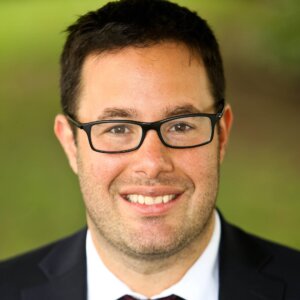I teach at an Ivy League university. The tolerance for antisemitism has become unbearable
As a university professor, I’ve watched some students voice extremely offensive views toward Israel and Jews under the banner of free speech since Oct. 7

Students participate in a protest in support of Palestine outside of the Columbia University campus on Nov. 15. A large banner reads, “by any means necessary,” with an image of the Palestinian flag Photo by Spencer Platt/Getty Images
One of the main synagogues in my native Venezuela was vandalized in January 2009. This hateful act was arguably perpetuated by government sympathizers following intense antisemitic rhetoric by Hugo Chavez that peaked during the Israel-Gaza conflict that same year.
After learning the news, I immediately called my grandmother, a Holocaust survivor (who was living in Caracas) to comfort her. I told her, “don’t worry, stay home and you’ll be safe.”
Her answer still haunts me: “You know, Dany, they also come find you at home.”
Her lesson to me was clear: Antisemitic speech very quickly transforms into violence and persecution. She and her generation knew what they were talking about.
As a professor of international and public affairs at Brown University, since the brutal Hamas attack on Oct. 7, I’ve watched some students increasingly voice extremely offensive views toward Israel and Jews under the banner of free speech. These span from justifying the brutal terror by Hamas as an act of legitimate resistance to advocating for the end of Israel as we know it, even repeating and chanting antisemitic tropes. In some cases, and not that infrequently, these demonstrations have been accompanied by attacks on Jewish students threatening their safety on campus, such as the violent antisemitic threats posted by a student at Cornell University, and the Jewish students who were forced to hide in the library at Cooper Union.
Universities, both administrators and faculty, can and must act swiftly and decisively.
In my day-to-day job, I teach complex public policy matters to college and graduate students. As you can imagine, many of these topics are quite contentious: immigration, trade, education, etc. Even when looking at the same data, people have different ideas about what is the “right” policy, often based on their own analysis of the trade-offs involved, and often driven by their backgrounds and experiences.
I see value in these disagreements. I try hard to make my classroom as inclusive as possible, encouraging everyone to share their views and disagreements, respectfully.
As the instructor, I know that having an inclusive classroom starts with me. Thus, I am very careful to choose every word that comes out of my mouth wisely, to talk about these complex topics without anyone taking offense. If I fail, even unintentionally, I risk hurting my students or even losing my job.
I expect faculty of all universities to do the same, both inside and outside of the classroom. Amid the current tensions, here is a message to all my faculty colleagues: You can take whichever side you want on this conflict, even if you — as is often the case — have no stake whatsoever in this part of the world. But if you do not start by outright condemning terrorism and calling out antisemitism whenever you see it as soon as you see it, then you are part of the problem, not the solution.
I also call on my colleagues in leadership positions at universities to enforce the universal codes and hold accountable students who are intentionally promoting hate speech on campus, such as justifying Hamas terror and promoting antisemitism. That means even considering on a case-by-case basis the expulsion of students justifying terror and violence, as well as antisemitic speech and actions, without double standards.
The recent actions by some universities, such as Brandeis and Columbia, to no longer recognize student groups is simply not enough. Students justifying terror, inciting violence and promoting antisemitism should be held accountable in their personal capacity. Whether or not there is “formal” recognition of their organizations doesn’t mean they can’t or won’t violate the most basic rules of coexistence.
This need not be a crazy idea. After all, in the not-so-distant past, universities have held students accountable when engaging in offensive behavior toward LGBTQ+ students and people of color, among others.
I will continue to make every effort I can to make my classroom an inclusive place, a place where everyone feels welcome and can voice their disagreements with respect.
But I expect all members of the academic community to abide by the same rules.
This is what academia expects from me. And this is what we should all expect from academia.
To contact the author, email [email protected]
A message from our Publisher & CEO Rachel Fishman Feddersen

I hope you appreciated this article. Before you go, I’d like to ask you to please support the Forward’s award-winning, nonprofit journalism so that we can be prepared for whatever news 2025 brings.
At a time when other newsrooms are closing or cutting back, the Forward has removed its paywall and invested additional resources to report on the ground from Israel and around the U.S. on the impact of the war, rising antisemitism and polarized discourse.
Readers like you make it all possible. Support our work by becoming a Forward Member and connect with our journalism and your community.
— Rachel Fishman Feddersen, Publisher and CEO




























